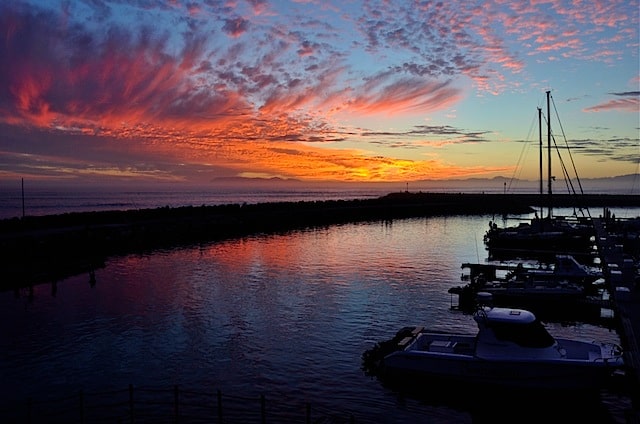I‘ve been speaking about a simple principle as I’ve witnessed it in South Africa over these past two years {the principle that without discipline nature will take over again} and I would now like to take a moment to speak about hope, and how all this can apply to our spiritual lives. {You can read part one here.}
For many of us, when we first answered the call to follow Jesus, we might remember a sharp about-face. That’s the way repentance should be: it is often described as if you are walking in one direction, and you make a one hundred and eighty degree turn, and start heading in the opposite direction.
The call to follow Jesus is often a call to swim upstream. It is a call to walk in ways that are contrary to our nature: loving our enemies, praying for our persecutors, learning that greatness is synonymous with service and that the last will be first. It is a call to choose love over fear, trust over worry.
We can start the race with these things in mind, eager to follow closely, to find the crosses we are called to bear and carry them with vigor and wholehearted enthusiasm. But over time, nature tends to take over, even in our own hearts.

Our natural tendencies will surface and resurface as we navigate the refining fires of a life of faith. Like gold being purified by fire, when things get hot, the undesirable elements begin to rise to the surface.
Zeal and ardent enthusiasm will only carry us so far. We will need discipline to overcome — to pass through those fiery furnaces and allow the Lord to remove the old nature in us as it rises to the surface.
But over time, we may become careless about matters that we were once committed to taking seriously as a part of our desire to follow the Lord. Perhaps it’s the words we are willing to allow out of our mouths, or the commitment to spending time in prayer, or studying God’s word and applying it to our lives.
Without discipline, nature takes over again.
Thankfully, no situation is without hope. With forethought and commitment, things which were allowed to go wild can be subdued and domesticated. Just as old roads can be rebuilt and repaired, so the tongue can be tamed and re-tamed. The wildfire of political corruption can be put out, just as the corruption in our own hearts can be made to acquiesce under the Lordship of Jesus.
None of this will be possible without a patient kind of discipline. In the case of a country, it is a united and sustained effort towards a common goal. In the case of our own souls, what is needed remains much the same.
There is great depth to the truth that the Crucifixion that brought us forgiveness was a lengthy and sustained affair. Jesus patiently submitted to the abuse and punishment of a mocking trial, a scourging, and hours of torture on a cross. He wasn’t shot or stabbed and he didn’t face the electric chair or a lethal injection. Our forgiveness wasn’t won with a sprint. It was paid for with a marathon — and endurance.
Could this be why Hebrews admonishes us:
Therefore, we also, since we are surrounded by so great a cloud of witnesses, let us lay aside every weight, and the sin which so easily ensnares us, and let us run with endurance the race that is set before us, looking unto Jesus, the author and finisher of our faith, who for the joy that was set before Him endured the cross, despising the shame, and has sat down at the right hand of the throne of God. (Heb. 12: 1 & 2}
It goes on to say, “For consider Him who endured such hostility from sinners against Himself, lest you become weary and discouraged in your souls.” {v. 3}
Indeed, the chastening of discipline has the promise to produce good fruit: “Now no chastening seems to be joyful for the present, but painful; nevertheless afterwards it yields the peaceable fruit of righteousness to those who have been trained by it.” {v. 11}
When the Hubs was training in the pool, in his days as a Swimming Champion and Olympic hopeful, he constantly meditated on the motto that pain was good. “No pain, no gain…” kept him pushing through another lap, strengthening his arms and legs to slice through the waters faster and faster.
But the race isn’t always to the swift. The seed that falls on good ground doesn’t spring up as quickly as the seed that falls in rocky places. We are called to a race akin to the marathons held in Greece in the first century that Paul alluded to when he spoke of running toward the prize.
Though our salvation is absolutely a gift of grace, yet the call to follow is simultaneously a call to become a disciple, to take up a cross. We can trust His yoke is easy and His burden is light. Still, there is a weight we are called to carry.
In Romans 12:2, Paul urges us not to be conformed to the image of this world {a world where we’re encouraged to “do what feels good” or to “follow your instincts”} but to be transformed by the renewing of our minds. He ends those words with this promise: “Then you will be able to test and approve what God’s will is–his good, pleasing and perfect will.”
Nature has a way of taking over again. But in God’s glorious goodness, for a beloved country or a beloved soul, there is always, always hope for transformation.
xCC

 I create resources to help people find deeper, more meaningful relationships with God through pursuing, pondering, and prayer. The "Shop" link above will take you to the home of many of the lovely resources I’ve created to help you keep walking one day deeper with Jesus.
I create resources to help people find deeper, more meaningful relationships with God through pursuing, pondering, and prayer. The "Shop" link above will take you to the home of many of the lovely resources I’ve created to help you keep walking one day deeper with Jesus.